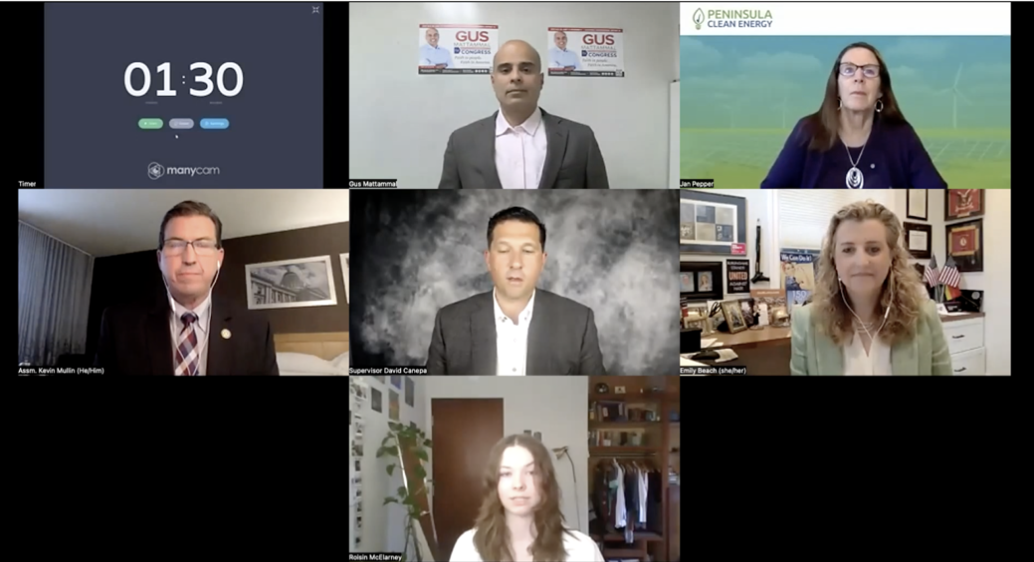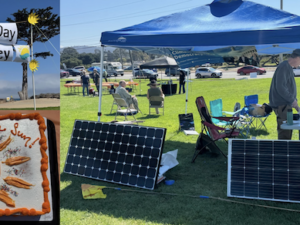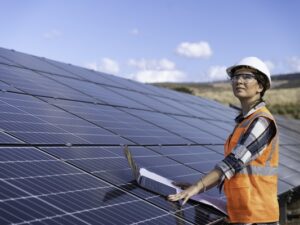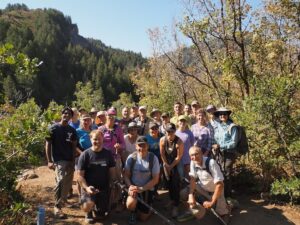
(Climate and Environment Congressional Forum participants: top row Republican Gus Mattammal, moderator Jan Pepper, CEO Peninsula Clean Energy; middle row Democrats Kevin Mullin, David Canepa, Emily Beach; bottom row San Mateo County chapter co-leader Roisin McElarney.)
CCL chapter gets midterm candidates talking climate
By Bob Steele and Ellyn Dooley
As CCL urges chapters to make climate an election issue, the San Mateo County chapter in California is off to a great start. On April 6, the San Mateo County chapter sponsored a “Climate and Environmental Forum” for four congressional candidates who ran in the June 7 primary. This forum was held over a Zoom webinar as candidates vied for the seat of Rep. Jackie Speier (D-CA-14). California’s open primary allowed candidates from all political parties to participate.
The forum began with a welcome statement by chapter co-leader Roisin McElarney. In this welcome statement, Roisin emphasized the role of teamwork at CCL and working across the aisle to address a topic that impacts all of us. Roisin reminded the congressional candidates that as a young person, she believes that climate is the issue that young voters are keen to vote on.
“On this unseasonably hot day with poor air quality, let’s remember that our wallets, our health, and the very air we breathe is at stake,” she said. “Climate activism isn’t just a hobby. It’s my chance at a livable future. I want my representative in Congress to be a leader on this issue — not someone who passively acknowledges it.”
A bipartisan climate discussion with the candidates
The forum’s moderator then introduced the candidates, who delivered personal statements and answered questions from the chapter members, the forum cosponsors, and the audience members.
The four forum participants were Emily Beach, David Canepa, Gus Mattammal and Kevin Mullin. Mattammal is a Republican, and Beach, Canepa, and Mullin are Democrats. Each offered different solutions to climate change.
Beach described herself as an “avid cyclist and public transportation nut” whose top campaign priority is climate action and justice. She identified some climate policies that she’d like to see, including the protection of open space and biodiversity, a carbon tax, and building sustainable infrastructure to prepare for rising sea levels and wildfire. Beach said she would bring young people on as advisors and members of her staff to help them enter the realm of climate advocacy.
Canepa identified the Green New Deal as his climate priority and touted technology as a key tool for addressing climate change. Canepa called on Congress to create “commercially viable carbon capture” and pushed for programs to engage youth in climate issues and give them the training and opportunity to do real work.
Mattammal, as a conservative businessman, promoted an economy-focused campaign. Mattammal identified his climate platform as reducing carbon by creating jobs “without demonizing entire industries that employ thousands of Americans.” He implored voters to consider “how we get to a cleaner environment by relying on the strengths of our markets.”
Mullin emphasized his experience in the California state assembly, as well as his work directly involving Speier. Mullin outlined a “Marshall Plan-level effort” for addressing climate change and, like Beach, endorsed a carbon tax. He also outlined his policy work addressing sea level rise in San Mateo County.
The breadth of perspectives offered in the forum shows what a valuable event this was for local CCLers to host. By organizing a space for a healthy bipartisan discussion of climate solutions, they demonstrated that climate is an issue that’s relevant to all voters — and should be a high priority for all candidates.
Behind the scenes
Bob Steele, a San Mateo County chapter member and congressional liaison for California’s District 14, shares some insight into the inspiration for the candidate forum.
“Our chapter sponsored an environment and climate candidate forum in January 2020 for the candidates running for our local state senate seat. It was organized by our then-liaison Alan Mattlage. Similar to the recent forum, he brought in cosponsors from several nonprofits and also had participating organizations who helped publicize the event. The forum was highly successful. Since this was just before the pandemic broke out, the event was live.”
Bob explains that as the new year rolled around, the San Mateo County chapter’s Steering Committee began discussing the possibility of sponsoring a congressional candidate forum, following the success of the 2020 forum.
“The Steering Committee members agreed that this would be a good idea, and I ended up being the leader of the planning committee. We basically followed Alan’s plan for the organization and production of the forum,” Bob says. “The main difference was that this forum was virtual, so the team had to work out the details of offering it on Zoom Webinar.”
Making the idea a successful reality
The main planning committee included San Mateo County chapter members John Keller, Rob Kahn, Marcy Ueckers, Cynthia Sandoval, and Roisin McElarney. Wendy Chou and Dave Cain also helped with event production, while Jan Pepper served as the forum moderator. Pepper is not a chapter member but is the CEO of Peninsula Clean Energy, which provides electricity from renewable sources to San Mateo County.
Bob shares some of the planning that the chapter had to do to make the online forum a reality.
“One of our team members had managed Zoom Webinar events, so we didn’t have to start from scratch on that. The main challenge was to get out publicity for the event so that we would get good attendance numbers. One of our team members worked on getting notifications in local media and online community event calendars. Our cosponsors and participating organizations were also very cooperative and helpful in publicizing the forum.”
Bob affirms that this hard work paid off.
“In the end, we had 345 advanced registrations on Eventbrite, of which 145 actually attended. We have had over 400 views of the forum recording that was posted on YouTube.”
Different facets of the local community got involved as well. The chapter recruited three local environmental nonprofits to cosponsor the forum as well as an additional 12 local participating organizations who helped to publicize it within their memberships. Additional publicity for the forum was generated by means of the chapter’s email lists and newsletter that goes out to all its supporters and through notification of local news media and online community event calendar postings. As a result, two local print media outlets published articles on the forum, including the Redwood City Pulse, and there was a video news segment on San Francisco TV station KTVU.
Making climate an election issue
The chapter leadership feels that sponsoring the forum was important in many ways: it established CCL as a significant entity within the local climate/environment community; it established goodwill toward CCL as a provider of an important public service; and most importantly, it raised the visibility of CCL with whoever is elected to Congress in November. It also underscored climate change as a critical election issue in our district. The chapter’s hope is that voters who have attended or viewed the forum will be better able to choose a candidate who has the climate and the environment as a central focus.
“We found the candidates to be well informed about climate issues and very responsive in their answers,” Bob shared. “Climate is a major issue in our area, and we feel that the candidates’ positions on climate issues rank high on the list of what our local voters take into account when deciding who to vote for. We believe that candidate forums are definitely something we would like to continue to sponsor.”
Are you or your chapter looking for ways to make climate an election issue? Check out this training about attending candidate forums and town halls here.





